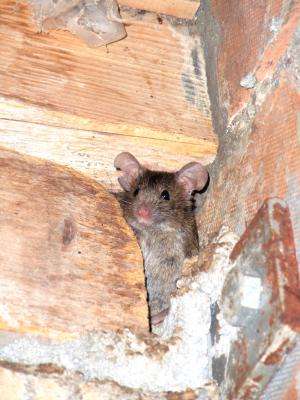Long-lived mice are less active

Female mice with a high life expectancy are less active and less explorative. They also eat less than their fellow females with a lower life expectancy. Behavioral biologists from the University of Zurich reveal that there is a correlation between longevity and personality for female house mice, and a minimum amount of boldness is necessary for them to survive.
Risky behavior can lead to premature death – in humans. Anna Lindholm and her doctoral student Yannick Auclair investigated whether this also applies to animals by studying the behavior of 82 house mice. They recorded boldness, activity level, exploration tendency and energy intake of female and male house mice with two different allelic variants on chromosome 17, thereby testing predictions of "life-history theory" on how individuals invest optimally in growth and reproduction. According to this theory, individuals with a greater life expectancy will express reactive personality traits and will be shy, less active and less explorative than individuals with a lower survival expectation.
Female mice of the t haplotype, one of the two genetic variants on chromosome 17, are known to live longer. The t haplotype in house mice is a naturally occurring selfish genetic element that is transmitted to 90 percent of the offspring by t carrying males. Embryos that inherit a t copy from both parents, however, die before birth. With his experiment, Yannick Auclair wanted to investigate whether there was a correlation between this selfish genetic element and the personality of the mice.
The researchers reveal that the longer-lived t haplotype females are less active than the shorter-lived non-carrier females. They also consume less food, are less explorative and thus express reactive personality traits favouring cautiousness and energy conservation, as predicted by theory. "For the first time, we report personality traits associated with a selfish genetic element that influences life expectancy" says Auclair. According to the research team, female mice with a longer life expectancy follow the strategy "live slow, die old" whereas those with a shorter life expectancy live according to the principle "live fast, die young".
In contrast to the predictions of the "life-history" theory, there are no extremely individuals among t haplotype female mice. The researchers suppose that selection does not favor mice that are too cautious. "In order for a mouse to find food and be able to reproduce, clearly a minimum level of boldness is required," explains Auclair. "In such a situation, large variation will not develop."
More information: Yannick Auclair, Barbara König, Anna K. Lindholm. A selfish genetic element influencing longevity correlates with reactive behavioural traits in female house mice. PLoS ONE. June 24, 2013. doi:10.1371/journal.pone.0067130
Journal information: PLoS ONE
Provided by University of Zurich
















